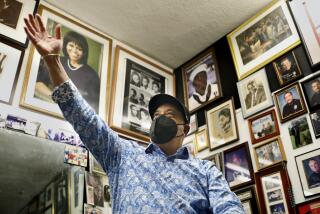Black Iraqi is keeping an eye on the U.S. presidential race
- Share via
BAGHDAD — Abdul Hussein Abdul Razzaq laughs wearily when asked whether racism is a problem in his homeland. As a black Iraqi, Razzaq says, he faces job and social discrimination and has little chance of getting a political appointment or being elected to public office.
That’s why Razzaq, a longtime journalist from the southern Iraqi city of Basra, is hoping that Barack Obama becomes the next president of the United States. Not only will it be better for Americans, he says, it will help blacks everywhere.
“It will prove that Americans are recognizing that black people are just as capable as white people,” he said. “It will be a historic accomplishment for black people all over the world if Barack Obama wins.”
Racism isn’t new in Iraq. Blacks were brought here as slaves from Africa more than 1,000 years ago to work for wealthy landowners in Basra, where most of Iraq’s black population still lives. Today, Razzaq says, one of the insults sometimes hurled at black people is abd, which means servant or slave in Arabic.
Razzaq has founded a political organization called the Free Iraqis Movement to press for equal rights. Its goal includes amending the Iraqi Constitution to ban discrimination against the nation’s blacks, who Razzaq says number about 2 million, and getting blacks elected to the national parliament.
He acknowledges that the effort so far has led to frustration. The movement is too broke to have a website, and it is having trouble generating support from Iraqis who are afraid of rocking the boat during these politically volatile times.
A recent visit to Baghdad to lobby leaders to support his cause was futile, with most people advising Razzaq that his movement could be seen as sowing divisiveness.
Another problem, Razzaq says, is that many of Iraq’s most powerful people still think of blacks as servants. Some tribal sheiks still keep blacks as slaves, he says.
Razzaq regrets that he didn’t launch his movement five years ago, after the toppling of Saddam Hussein’s regime.
“We didn’t do it then because we were worried about being accused of trying to stir up trouble at a time of nation-building,” he said. “We had hoped the new parliament would come to include black people, but that did not happen.”
As he travels through the country, Razzaq carries with him the resumes and biographies of black Iraqis who he says have been denied jobs and high political appointments because of their race.
If Obama wins in November, he’s hoping that Iraq’s leaders will take a closer look at the documents and give black Iraqis a chance.
And if John McCain wins?
“It will be a big disappointment,” Razzaq says.
--
More to Read
Sign up for Essential California
The most important California stories and recommendations in your inbox every morning.
You may occasionally receive promotional content from the Los Angeles Times.














